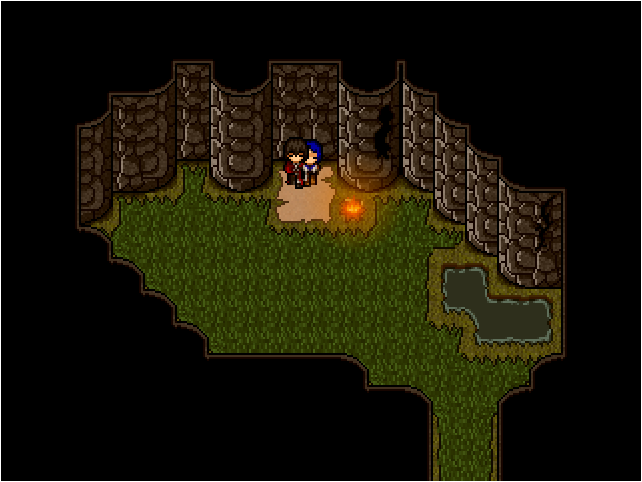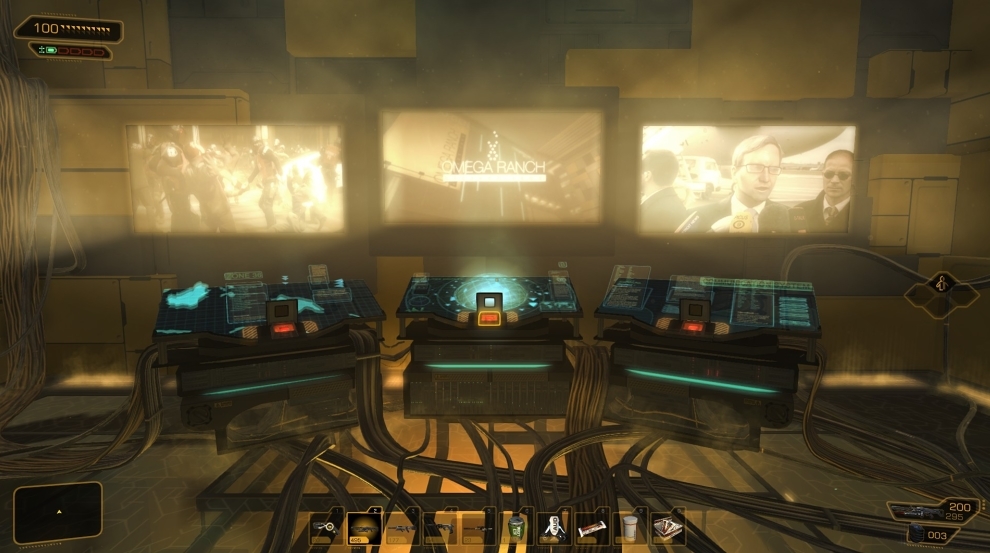 Add Review
Add Review Subscribe
Subscribe Nominate
Nominate Submit Media
Submit Media RSS
RSS
Thoughts on Game Endings
 Red_Nova
Red_Nova- 06/02/2019 08:49 PM
- 2779 views
I've never exactly kept it a secret that Prayer of the Faithless was set just before the inevitable end of the world. Because of that, I knew that handling the multiple ways the story can conclude was going to be an uphill battle from the very beginning. After all, how else can you end a story with such a definitive finale already ingrained into its core premise? Last week, when I released chapter 4 to testers and began polishing the endgame, I found myself thinking about this a lot more.

Fair warning: While I'm obviously not going to mention anything specific about the CONTENTS of PotF's endings, I will be talking a little about my approach to designing endings, using references that COULD be taken as indirect spoilers. If you wish to go into PotF completely blind, this is not the blog for you. Turn back now.
.....
.....
.....
.....
.....You still here? Okay, then.
First of all, I'd like to make a very clear distinction on what PotF actually is and, more importantly, what it is NOT. Prayer of the Faithless is not a story ABOUT the end of the world; it is a character-driven story that INVOLVES the end of the world. If the game really was ABOUT the end of the world, then I likely would have been done in a single month. Because the focus is on the people in the world rather than the world itself, that opens up more possible directions to take the story.
But, no matter how many options there are, the story has to end somehow. And that is where my struggles currently lie.
When designing the endings for PotF, I fell back on a few rules I try to adhere to for character-driven game stories:
1: Every ending is canon
You may be familiar with the concepts of the "bad," "normal," and "true" endings in a game. The idea that not completing certain objectives could lead to an unsatisfying ending or that fulfilling certain objectives would lead to the complete, canon ending. I totally understand the intent behind designing endings this way, and I don't begrudge their inclusion.
However, they do not exist in Prayer of the Faithless. There is no one "true" ending, nor is there an ending that punishes players if they missed a vital component earlier in the game. However the characters decide to complete their objectives, each ending should be just as conclusive and fulfilling as each other.
2: Ending titles
Anyone ever play Silent Hill 2? I could probably devote an entire blog post discussing why I adore the way it handles endings. For the purposes of this blog, though, I just want to bring up the names of each main ending: Leave, Maria, and In Water. For those who haven't played Silent Hill 2 (and if you have, pretend you haven't for a second), can you at least attempt an explanation as to what each ending could possibly mean? I doubt you would be able to do so. But what if I renamed the three endings to "Guilt," "Acceptance," and "Selfish?" Do you think you have a better grasp of what each ending represents now?
On the surface, it may look like a simple name change. However, I like to think that the names are vague to allow for the inclusion of multiple meanings/spins on the central theme. PotF's endings will function the same way. Each ending should encompass the central theme of what it's going for without being so specific that it runs the risk of diluting each individual experience and interpretation of the game. Plus, there's the benefit of being able to mention the endings without spoiling anyone still going through the game!
3: Scrap the End-O-Tron 3000

One of the most infuriating ways I've seen games determine endings is, right before the end credits, presenting players with a choice of what kind of ending they want. Players pick an option, see the ending, and that's it. Done.
I can kinda see that working in, say, a game without a predefined main character like Elder Scrolls, since a blank slate character with no predefined personality would benefit from having options to let players roleplay as to what they would want. However, more often than not it looks to me like a time/budget constraint. If that's the case, then fair enough, but as a deliberate design choice, it just screams "cop-out" to me. So this method of determining endings will not be present in PotF.
------------------
That's about all I can really talk about without delving into the contents of the PotF's endings themselves, so I'm going to end the blog here. What I want to really get across here is that writing these endings involve a LOT of references, cross-checking, and questioning as many "what if they..." scenarios as I can to make sure that each ending gets the time and respect it deserves. This is extremely exhausting for both my time and sanity, and at some point I'll have to step back and say "that's enough." Otherwise, this game will never be completed.
If players don't want to try for the other endings, then I want to send them off on a high note. For a game involving the end of the world, that's... a real challenge, to say the least.

Fair warning: While I'm obviously not going to mention anything specific about the CONTENTS of PotF's endings, I will be talking a little about my approach to designing endings, using references that COULD be taken as indirect spoilers. If you wish to go into PotF completely blind, this is not the blog for you. Turn back now.
.....
.....
.....
.....
.....You still here? Okay, then.
First of all, I'd like to make a very clear distinction on what PotF actually is and, more importantly, what it is NOT. Prayer of the Faithless is not a story ABOUT the end of the world; it is a character-driven story that INVOLVES the end of the world. If the game really was ABOUT the end of the world, then I likely would have been done in a single month. Because the focus is on the people in the world rather than the world itself, that opens up more possible directions to take the story.
But, no matter how many options there are, the story has to end somehow. And that is where my struggles currently lie.
When designing the endings for PotF, I fell back on a few rules I try to adhere to for character-driven game stories:
1: Every ending is canon
You may be familiar with the concepts of the "bad," "normal," and "true" endings in a game. The idea that not completing certain objectives could lead to an unsatisfying ending or that fulfilling certain objectives would lead to the complete, canon ending. I totally understand the intent behind designing endings this way, and I don't begrudge their inclusion.
However, they do not exist in Prayer of the Faithless. There is no one "true" ending, nor is there an ending that punishes players if they missed a vital component earlier in the game. However the characters decide to complete their objectives, each ending should be just as conclusive and fulfilling as each other.
2: Ending titles
Anyone ever play Silent Hill 2? I could probably devote an entire blog post discussing why I adore the way it handles endings. For the purposes of this blog, though, I just want to bring up the names of each main ending: Leave, Maria, and In Water. For those who haven't played Silent Hill 2 (and if you have, pretend you haven't for a second), can you at least attempt an explanation as to what each ending could possibly mean? I doubt you would be able to do so. But what if I renamed the three endings to "Guilt," "Acceptance," and "Selfish?" Do you think you have a better grasp of what each ending represents now?
On the surface, it may look like a simple name change. However, I like to think that the names are vague to allow for the inclusion of multiple meanings/spins on the central theme. PotF's endings will function the same way. Each ending should encompass the central theme of what it's going for without being so specific that it runs the risk of diluting each individual experience and interpretation of the game. Plus, there's the benefit of being able to mention the endings without spoiling anyone still going through the game!
3: Scrap the End-O-Tron 3000

One of the most infuriating ways I've seen games determine endings is, right before the end credits, presenting players with a choice of what kind of ending they want. Players pick an option, see the ending, and that's it. Done.
I can kinda see that working in, say, a game without a predefined main character like Elder Scrolls, since a blank slate character with no predefined personality would benefit from having options to let players roleplay as to what they would want. However, more often than not it looks to me like a time/budget constraint. If that's the case, then fair enough, but as a deliberate design choice, it just screams "cop-out" to me. So this method of determining endings will not be present in PotF.
------------------
That's about all I can really talk about without delving into the contents of the PotF's endings themselves, so I'm going to end the blog here. What I want to really get across here is that writing these endings involve a LOT of references, cross-checking, and questioning as many "what if they..." scenarios as I can to make sure that each ending gets the time and respect it deserves. This is extremely exhausting for both my time and sanity, and at some point I'll have to step back and say "that's enough." Otherwise, this game will never be completed.
If players don't want to try for the other endings, then I want to send them off on a high note. For a game involving the end of the world, that's... a real challenge, to say the least.
Posts 

Pages:
1
I think not having a canon "true ending" is the right choice here, as having one can often deter players from wanting to seek out the other endings if they're not invested enough in your game to begin with. Heck, my game Soma Spirits has five endings, but very few players did any of them other than the True Ending route.
Labeling one ending as the canon, or otherwise the requirement for a "perfect" game can leave an awful lot of hard work undiscovered or even avoided. And it unfortunately mitigates the illusion of choice.
Labeling one ending as the canon, or otherwise the requirement for a "perfect" game can leave an awful lot of hard work undiscovered or even avoided. And it unfortunately mitigates the illusion of choice.
One alternative idea is to have one definite ending but unlockable (Non Canon) post credit scenes. For example, game ends with hero saving the world but post credit scene A reveals that it was all just a dream. However if the player unlocks Post credit scene B, it turns out everything took place inside a overgrown petri dish.
Not the best examples out there but the idea itself would maintain the integrity of the one true ending but would give you some experimental creative leeway and avert the potential nightmare of writing multiple satisfying conclusions.
Not the best examples out there but the idea itself would maintain the integrity of the one true ending but would give you some experimental creative leeway and avert the potential nightmare of writing multiple satisfying conclusions.
I want to play Prayer of the Faithless completely blind once it is finished, so I didn't look past your spoiler warning. So looking forward to this being finished! I trust in your ability to do a fantastic job here, and want to experience another one of your awesome stories.
I've always had beef with the idea of a True Ending. If every ending isn't going to be True, the conclusion to the game is just a punishment for players that didn't make all the choices the devs wanted them to make.
Some endings can be happier than others, but, yeah, I am 100% on board with having all endings need to be a valid conclusion to the story.
Some endings can be happier than others, but, yeah, I am 100% on board with having all endings need to be a valid conclusion to the story.
Now that I think on it, I've made games where the ending is based off of some manner of End-O-Tron 3000 method. Even then, the choice that the player makes doesn't really generate widely different endings. Maybe a textbox or two gets changed to reflect the choice made.
I... kinda think about Mass Effect 3 in this regard.
Players can choose between the "Control" or "Destroy" endings, or whatever. If they have high enough galactic readiness, "Synthesis" also becomes an option. However, the differences in cutscenes that follow boils down to what color the waves of energy the Crucible generates.
Whither or not the Normandy crash-lands, or who all comes out of it may be other variables that determine what the player sees, but, yeah, the bulk of the ending cutscenes are determined by that choice in the Crucible.
At least, if memory serves. It's been a while.
I... kinda think about Mass Effect 3 in this regard.
Players can choose between the "Control" or "Destroy" endings, or whatever. If they have high enough galactic readiness, "Synthesis" also becomes an option. However, the differences in cutscenes that follow boils down to what color the waves of energy the Crucible generates.
Whither or not the Normandy crash-lands, or who all comes out of it may be other variables that determine what the player sees, but, yeah, the bulk of the ending cutscenes are determined by that choice in the Crucible.
At least, if memory serves. It's been a while.
I personally don't mind Big Choices at the very end of a game. Toymaker has one that's excellent. And if an ending's purely choice-based, the player's never going to get locked out of seeing the True ending. I think it feels cheap if the choice isn't meaningful, but weighty if it is and if each option gets followed through on.
Mass Effect 3's problem, I think, is with that last bit. For me, at least, none of 3's endings feel like a valid conclusion to the themes and design of the rest of the series. They just kind of happen. And the choice loses any real bite because it's not honestly much of a choice.
Mass Effect 3's problem, I think, is with that last bit. For me, at least, none of 3's endings feel like a valid conclusion to the themes and design of the rest of the series. They just kind of happen. And the choice loses any real bite because it's not honestly much of a choice.
Besides Mass effect 3's pick a jelly bean ending, I felt everything leading up to the conclusion served as an effective ending. The choices we made throughout the series gave us different outcomes on the genophage along with the eventual fate of the Quarian and Geth conflict. Plus every one of our squad mates had a fitting send off in some form or another.
Not sure why but in every playthrough, I kept shooting Mordin for some reason or another D:
Not sure why but in every playthrough, I kept shooting Mordin for some reason or another D:
Edit: Never mind, I didn't read things properly hehe :sweat:
I am excited about the idea of vague endings :)
I am excited about the idea of vague endings :)
Red_Nova

Sir Redd of Novus: He who made Prayer of the Faithless that one time, and that was pretty dang rad! :D
9192
author=Sgt M
I think not having a canon "true ending" is the right choice here, as having one can often deter players from wanting to seek out the other endings if they're not invested enough in your game to begin with. Heck, my game Soma Spirits has five endings, but very few players did any of them other than the True Ending route.
Labeling one ending as the canon, or otherwise the requirement for a "perfect" game can leave an awful lot of hard work undiscovered or even avoided. And it unfortunately mitigates the illusion of choice.
Not that it CAN'T be done well. I think Persona 4 did an alright job of handling a "true" ending because the concept was a part of the game's mystery premise. Chrono Trigger also did a good job with it because you're given the end goal pretty early on, and there's a lot of fun to be had beating Lavos at different periods in the story.
Sorry to hear about the lack of exposure to the other endings. It's a real shame to see all that work go unnoticed.
author=StarSkipp
One alternative idea is to have one definite ending but unlockable (Non Canon) post credit scenes. For example, game ends with hero saving the world but post credit scene A reveals that it was all just a dream. However if the player unlocks Post credit scene B, it turns out everything took place inside a overgrown petri dish.
Not the best examples out there but the idea itself would maintain the integrity of the one true ending but would give you some experimental creative leeway and avert the potential nightmare of writing multiple satisfying conclusions.
Those suggestions sound more like joke endings than real endings. I don't really hold joke endings up to the same standards at real endings. Heck, I mentioned Silent Hill 2 as one of the best ways to design an ending system, and that game had an ending where the entire town was operated by a dog.
author=CashmereCat
I want to play Prayer of the Faithless completely blind once it is finished, so I didn't look past your spoiler warning. So looking forward to this being finished! I trust in your ability to do a fantastic job here, and want to experience another one of your awesome stories.
Thanks Cash!
author=Marrend
I... kinda think about Mass Effect 3 in this regard.
That's about right, but, like Starskipp said, the game was almost totally comprised of multiple conclusions for different parts of the journey. Mass Effect 3's endings felt more like budget constraints to me than an actual deliberate design decision, especially since everything leading up to that point was spot on.
author=StarSkipp
Not sure why but in every playthrough, I kept shooting Mordin for some reason or another D:
:(((((((
Pages:
1
















